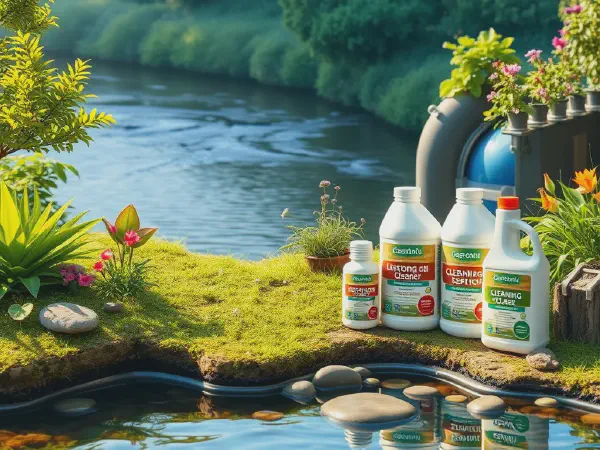Safe and Effective Drain Cleaners for Septic Systems

Best Drain Cleaners for Septic Systems: Safe and Effective Options
When it comes to maintaining a healthy septic system, using the right drain cleaner is crucial. Many homeowners are searching for the Best Drain Cleaners for Septic Systems that are both safe and effective in removing clogs without harming the delicate balance of bacteria necessary for septic systems to work properly. This comprehensive article will guide you through the options available and help you make an informed decision.
Opting for the Best Drain Cleaners for Septic Systems is more than just choosing a product off the shelf; it's about understanding the ingredients and types of cleaners available. Biological and enzymatic cleaners have gained popularity due to their safe and environmentally friendly nature, making them ideal for septic systems. Additionally, this article will discuss the potential risks associated with harsh chemical cleaners that can disrupt the septic environment and provide insight into alternative solutions.
Regular maintenance is key to preventing drain issues and ensuring the longevity of your septic system. The right drain cleaner can help alleviate clogs, but it's equally important to combine it with routine maintenance practices. This article will also offer DIY alternatives, preventative measures, and tips for maintaining the efficiency of your septic system, ensuring every homeowner can access effective solutions.
Understanding how to use drain cleaners effectively is essential for achieving results. From identifying the type of clogs to determining how often to use cleaners, this article aims to equip you with the necessary knowledge to maintain your septic system safely. Whether you're dealing with minor slow drains or serious clogs, finding the right product that aligns with your system's needs is paramount.
Finally, we will explore customer reviews and expert recommendations to narrow down the top-rated products in the market. Hearing from those who have used various drain cleaners can provide valuable insights into what works best for different situations. Ultimately, our goal is to help you find the Best Drain Cleaners for Septic Systems that are safe, effective, and suitable for your unique needs.
Types of Drain Cleaners
1. Biological Drain Cleaners for Septic Systems: These drain cleaners utilize natural bacteria and enzymes to break down waste materials and organic matter found in drains. They are considered safe for septic systems because they enhance the natural bacterial action, supporting the breakdown of waste without introducing harsh chemicals that can disrupt the ecosystem.
2. Enzymatic Drain Cleaners Overview: Enzymatic cleaners work similarly to biological cleaners but focus on using enzymes to break down clogs caused by hair, grease, soap scum, and food particles. These products are non-toxic and help maintain the necessary bacterial balance in septic systems while effectively cleansing drains.
3. Chemical Drain Cleaners and Their Risks: While chemical drain cleaners can effectively dissolve clogs, they often contain corrosive substances that can harm pipes, septic bacteria, and the environment. It’s vital to use caution with these products, as they can lead to long-term damage to your septic system's functioning and may pose health risks when inhaled or improperly handled.
Safety Considerations
Choosing Safe Ingredients for Septic Systems: The key to selecting a safe drain cleaner is to look for products specifically labeled as safe for septic systems. These often contain natural or biological ingredients rather than harsh chemicals, ensuring the preservation of beneficial bacteria essential for septic functionality.
Avoiding Harmful Chemicals: Drain cleaners containing sulfuric acid, bleach, or other toxic chemicals can destroy the good bacteria in your septic tank, leading to malfunction and costly repairs. Always read labels carefully and avoid cleaners that do not specify septic safety to ensure the health of your system.
Environmental Impact of Drain Cleaners: Opting for environmentally friendly products can help mitigate contamination risks. Choose cleaners that are biodegradable and free from harmful pollutants to preserve the environment and contribute to sustainable practices, especially for those on septic systems.
Effectiveness of Drain Cleaners
How to Measure Effectiveness: The effectiveness of a drain cleaner can be assessed by its ability to successfully eliminate specific types of clogs, its speed of action, and how well it maintains proper drainage over time. Many dependable products will indicate their expected results and success rate on their packaging.
Using Cleaners for Different Clogs: Different types of clogs may require specialized approaches. For instance, enzymatic cleaners are better suited for organic material clogs, while biological cleaners can handle a range of waste types. Understanding your clog’s nature will guide you in selecting the most effective product.
Frequency of Use Recommendations: Overusing drain cleaners may harm your septic system. It's best to use biological and enzymatic cleaners regularly, perhaps once a month, to maintain a healthy flow and prevent severe clogs. Following manufacturer recommendations is essential for effectiveness and safety.
DIY Alternatives
Homemade Drain Cleaning Solutions: Many effective homemade drain cleaners, like a simple mixture of baking soda and vinegar, can safely clear minor clogs and maintain drains. These solutions are often cost-effective and safe for your septic system.
Natural Ingredients for Safe Cleaning: Ingredients like baking soda, vinegar, and salt can serve as natural drain cleaners. Utilizing these natural cleaning agents supports the bacterial balance in your septic system and avoids introducing harmful chemicals.
Cost-Effectiveness of DIY Cleaners: Homemade drain cleaners are not only environmentally friendly but also affordable. By using everyday household items, you can save money on commercial products while still maintaining a clean and functioning septic system.
Maintenance Tips for Septic Systems
Regular Maintenance Schedule: Establishing a routine for inspecting and maintaining your septic system will help prevent clogs and enhance performance. A typical recommendation is to have your system pumped every three to five years, depending on household size and usage.
Signs You Need Cleaner: Recognizing the signs of a clogged drain, such as slow drainage or unpleasant odors, can help you act quickly to prevent major issues. Once identified, timely action using the appropriate cleaner is key to resolution.
Preventative Measures for Drain Issues: To avoid heavy clogs, consider implementing habits like disposing of grease properly, using drain screens, and avoiding flushing inappropriate items down the toilet, which can reduce clogged drains and maintain your septic system's health.
Customer Reviews and Recommendations
Top Rated Products: Researching customer reviews online can provide a wealth of information about the top-rated drain cleaners that are safe for septic systems. Popular options often include brands that specialize in biological or enzymatic formulations.
User Experiences with Different Cleaners: Firsthand experiences from users can shed light on which products perform best under certain conditions. Taking into account a variety of ratings and comments can guide you toward the most trusted options.
Expert Reviews on Effectiveness: Consulting expert reviews can help you understand which drain cleaners have been endorsed for their effectiveness, safety, and specific use cases for septic systems. Look for recommendations from plumbing professionals or environmental agencies.
